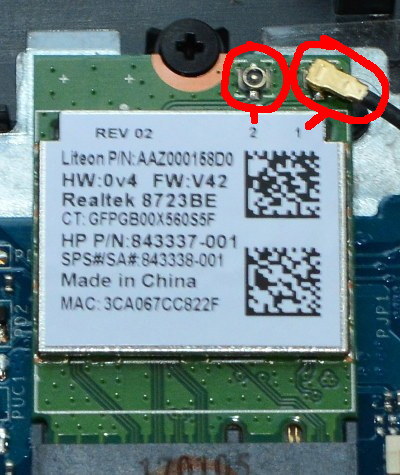HumanINC
29 Czerwiec 2019 10:50
#1
Czołem,Disconnected - i tak w kółko. Ponadto widoczne są sieci, które są blisko, wynikałoby na to jakby drastycznie zmniejszył się zasięg…
Spotkał się ktoś z takim problemem? Byłbym wdzięczny za każdą wskazówkę.
Spróbuj tak: kliknij prawym klawiszem myszki na ikonce sieci -> Modyfikuj połączenia -> wybierz swoją WiFi -> Właściwości (hamburgerowe menu, koło zębate) -> zakładka “Ogólne” -> zaptaszkuj “wszyscy użytkownicy mogą łączyć się z tą siecią”.
HumanINC
29 Czerwiec 2019 13:48
#3
Opcja była zaznaczona cały czas. Niestety problem dalej występuje.
marcin82
29 Czerwiec 2019 13:57
#4
Podaj dokładny model laptopa, wersję Xubuntu i wyniki poleceń z terminala / konsoli:
lspci -kjournalctl -b -p 4..4
HumanINC
29 Czerwiec 2019 15:15
#5
Kiano Elegance 14.2 PRO,
lspci-i
00:00.0 Host bridge: Intel Corporation Celeron N3350/Pentium N4200/Atom E3900 Series Host Bridge (rev 0b)#1 (rev 0b)#2 (rev 0b)#3 (rev 0b)#4 (rev 0b)#5 (rev 0b)#6 (rev 0b)#7 (rev 0b)#8 (rev 0b)#1 (rev 0b)#2 (rev 0b)#3 (rev 0b)#4 (rev 0b)#1 (rev 0b)#2 (rev 0b)#3 (rev 0b)
journalctl -b -p 4…4
cze 29 17:10:11 kiano kernel: ACPI Warning: GPE type mismatch (level/edge) (20181213/evxface-792)
PS. Obecnie korzystam również z zewnętrznej karty Wi-Fi. Która może być widoczna w wyniku powyższych poleceń.
Domker
2 Lipiec 2019 18:42
#6
Tam jest chyba ten moduł WiFi:
Cały problem z dużo zmniejszonym zasięgiem jest tam taki, że są tam dwa porty na antenkę i Linux ustawia Ci target na ten port, gdzie antenka nie jest podłączona.
Rozebranie lapka i przepięcie antenki
Softwarowy fix:lspci | grep Network
Jeżeli tak to:
Robisz konfig:sudo echo "options rtl8723be ant_sel = 1" >/etc/modprobe.d/rtl8723be.conf
Potem:
sudo rmmod -r rtl8723be
sudo modprobe rtl8723be
Jak dalej będzie źle to:sudo rm /etc/modprobe.d/rtl8723be.conf
sudo echo "options rtl8723be ant_sel = 2" >/etc/modprobe.d/rtl8723be.conf
Potem:
sudo rmmod -r rtl8723be
sudo modprobe rtl8723be
Znowu sprawdzasz, czy pomogło
Tak jak mówię powyższe polecenia powinny zadziałać dla RTL8723BE.
HumanINC
2 Lipiec 2019 19:01
#7
Dzięki za wskazówki, niestety kiedy wpisuję: lspci | grep Network nic się nie wyświetla.
lshw -numeric -C network
a dla karty wifi może być coś takiego
sudo lshw -numeric -C network | grep wireless | grep driver
[sudo] hasło użytkownika :
configuration: broadcast=yes driver=rt2800usb driverversion=3.10.0-957.21.3.el7.x86_64 firmware=0.36 ip=192.168.2.4 link=yes maxpower=450mA multicast=yes speed=480Mbit/s wireless=IEEE 802.11
Następnie możesz sprawdzić jaką masz moc na karcie ustawioną:
iwconfig | grep Tx-Power
enp2s0 no wireless extensions.
Bit Rate=72.2 Mb/s Tx-Power=20 dBm
Sprawdz jakie może możesz ustawić na karcie maks:sudo iw reg get
U mnie dla 2,4 Ghz jest maks 20 dbm i tyle mam ustawione ale na różnych kartach może być różnie i może być ustawiony niższy Tx-rate
wiecej na ten temat:

